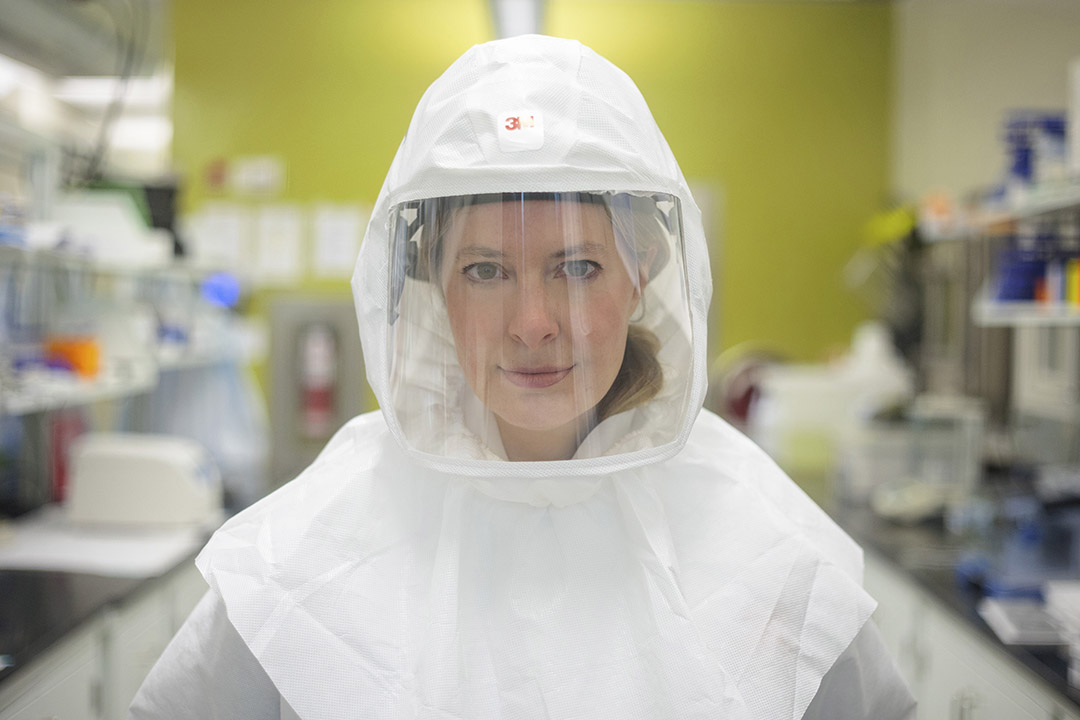
VIDO scientists receive $1M to strengthen mpox preparedness
Scientists Drs. Alyson Kelvin (PhD) and Angela Rasmussen (PhD) from the University of Saskatchewan’s (USask) Vaccine and Infectious Disease Organization (VIDO) have received $1-million in total funding to study mpox (formerly known as monkeypox) from the Canadian Institutes of Health Research (CIHR).
The scientists were successful in CIHR’s “Team Grant: Mpox (monkeypox) and zoonotic threats.”
Mpox re-emerged in 2022—resulting in over 87 thousand confirmed cases and 141 deaths in 111 countries. Although it is no longer labeled a public health emergency of international concern, the World Health Organization stated it continues to be a significant public health challenge requiring a proactive and sustainable response.
“Strengthening capacity and expertise is critical to respond to emerging and re-emerging infectious diseases—like mpox—and further defines VIDO role as Canada’s Centre for Pandemic Research,” said VIDO Director and CEO Dr. Volker Gerdts. “The support from CIHR will help prevent future outbreaks of mpox and other related viruses in Canada and globally.”
Investigating mpox virus spillover and spillback at the human-animal interface
Previous mpox outbreaks were caused by virus spillover from an unknown animal reservoir in endemic regions (regions with a constant presence of virus) such as the Democratic Republic of Congo (DRC). However, research into the roles of animal reservoirs in human outbreaks, and the potential for new animal reservoirs in naive wildlife, have largely been neglected and the mechanisms of transmission are not well understood.
Kelvin will lead a project to understand virus transmission at the human-animal interface. She highlights, “by determining what wild animals can harbour the virus and then how these animals interact with people, we will be able to prevent new infections in Canadians and North American wildlife, as well as the international spread of this virus causing public health emergencies of international concern.”
Kelvin’s team will follow positive human cases in the DRC to determine virus spillover events from wildlife, as well as spillback into companion animals driven by infected humans. Positive human and animal samples will be sequenced to establish chains of virus transmission. This will be followed by studies in VIDO’s containment Level 3 laboratory to determine the potential for mpox virus to infect Canadian wildlife species, such as the North American beaver, and act as a reservoir which could initiate transmission chains in Canada.
Collaborating in the project is the International Monkeypox Response Consortium (IMReC) which includes scientists from regions of continental Africa, as well as international virologists and viral ecologists from the University of Manitoba, University of Arkansas, University of California, Los Angeles, and the DRC.
Developing a genetically diverse mpox model to examine host responses and therapeutics

The host’s response to an infection is a critical determinant of disease severity. However, the host response to mpox infection and how it relates to disease progression is largely unknown. Furthermore, although antiviral therapies can effectively treat mpox, research is needed to determine their optimal use to resolve symptoms.
Current mpox disease models are not genetically diverse and are unable to reproduce the range of disease seen in human patients. Rasmussen and her team will use the Collaborative Cross, a panel of genetically diverse mice, to study the host responses to mpox infection that lead to specific disease outcomes. Rasmussen’s team will also test the ability of antiviral drugs to improve mpox disease features such as skin lesions when treatment is initiated at different times following infection.
“A major goal of our project’s work is to improve clinical outcomes for 2SLGBTQIA+ communities disproportionately affected by the 2022 epidemic, as well as make a scientific case for broader access to therapeutics around the world,” stated Rasmussen. “This research will provide insight into the role of the host response in determining mpox disease severity and help optimize the use of antivirals to treat mpox and provide the greatest benefit to patients.”
The project will establish a mouse model that will be a valuable resource to the scientific community for studying mpox and developing improved vaccines and therapies.
Rasmussen will collaborate with scientists from VIDO, the University of Manitoba, Texas A&M University, New York University, and an industry partner.
Article re-posted on .
View original article.
Together, we will undertake the research the world needs. We invite you to join by supporting critical research at USask.
